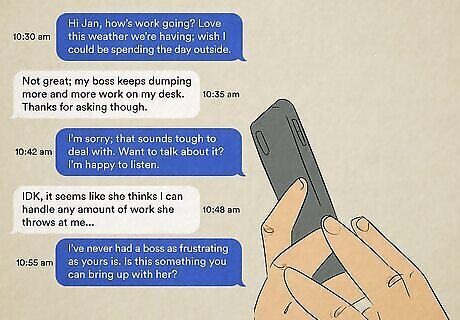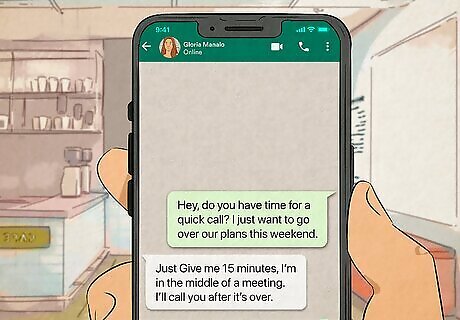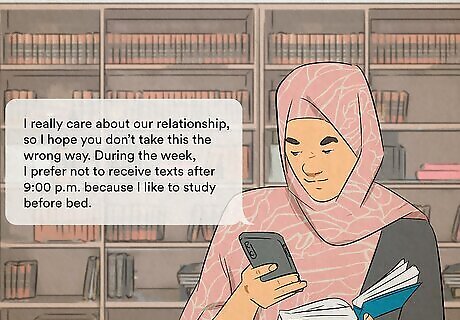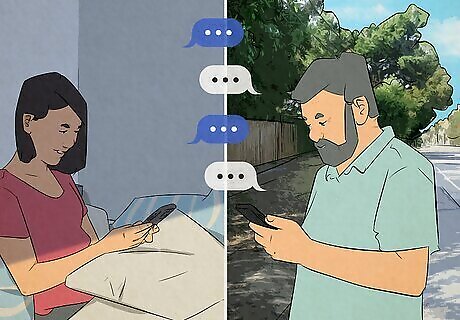
views
- Text serious partners at least once a day. Many people in established relationships like to send a few texts back and forth as they go about their day.
- Text people you’re casually dating a few times a week. If you’re not in a serious relationship, it’s common to mainly use texting as a way to schedule in-person meet-ups.
- Try to match your partner’s texting speed, and have a conversation with them about how you like to communicate if you feel like your needs aren’t being met.
How often should you talk to your partner?

While every couple is different, it’s common for partners to talk a few times a day. Sending a few texts back and forth and maybe talking on the phone at some point during the day is pretty normal for people in committed relationships. However, people in more casual relationships might only talk every other day or a few days a week. Some people like to be in constant contact, while others may only want to text a few times a week. Talk to your partner to find out what sort of texting schedule works best for both of you. If you’re in a long-distance relationship, try to set up virtual dates to make your relationship more intimate and less text-based.
Texting Tips for Dating

Check in with serious partners at least once a day. Many people expect their serious partners to message them daily, so choose a time during the day when you know they’re available to ask them how they’re doing, update them about something that happened to you, or let them know you’re thinking about them. For example, you could send something like, “Hi hi! You’ve been on my mind a ton today ???? How’s your day going?” As another example, you could say, “Hey ???? my day has been SO crazy so far. I hope your day is doing better than mine!” If you’re in a brand new relationship with someone, texting every day might seem a little overbearing. It’s okay to leave a few lulls in the conversation. However, a daily text is expected in a lot of exclusive relationships.

Send pictures, videos, and interesting media you’ve found. Whether you’re in a long-term relationship or just started dating, dating expert John Keegan recommends “keep[ing] the energy going throughout the day [by]...send[ing] little things that create a feeling of cuteness, love, playfulness, or silliness.” To bring a long-distance partner more into your life, Keegan says you can send pictures of the view you’re seeing, weird things that you saw, or songs that you like: “nothing that’s too much of a time waste or commitment, but something simple that can cause an immediate emotional reaction.”

Wait about 4 hours before double texting. There’s a chance your partner missed your last message if they were busy with something else. After a few hours, it’s okay to send another message even if they didn’t reply to your first text. That way, you let your partner know you’re still thinking of them without acting too pushy. Try to restart the conversation rather than saying a sarcastic and insensitive comment like, “Wow good convo.” Keegan warns to not put pressure on your partner by interrogating them about not responding. “[A]void anything needy,” he says, including texts like “Where were you last night? I texted you. Why didn’t you respond?”

Give your partner time to respond. While a double text is fine after the first few hours, wait until your partner replies before sending any other messages. It may be a few hours or days for a casual relationship, but it’s probably going to be within the day if you’ve been together for a while. Give your partner the benefit of the doubt if they don’t reply right away. There’s a chance that they're busy and weren’t able to check their phone.

Match your partner’s texting speed. If they take a few hours to reply, you can wait the same amount of time. At the start of a relationship, you might both eagerly text back and forth without a break, but as it progresses it’s normal for texting to slow down. As long as it’s not time-sensitive, it’s okay to reply later. Try to write your texts so they’re about the same length as your partner’s. That way, you can keep the conversation going rather than using one-word replies. Your texting speed might vary depending on how far you are in the relationship. If you’re in something pretty casual, you may have a few days between messages. If you’re long-distance or have been together for a while, you might communicate more frequently to stay in touch.

Ask if they’re available to talk before calling. If you’d rather hear your partner’s voice, send them a text asking what they’re up to and that you’d like to call them. That way, your partner has a chance to let you know that they’re busy without causing too much distraction. For example, you could say, “Hey, do you have time for a quick call? I just want to go over our plans this weekend.” You could also say something like, “I have a question but it’s a little confusing to type out. Can I call you?”

Save serious topics for phone calls. Dating coach Imad Jbara warns that “[since] a lot of things can get misconstrued over text, miscommunication is huge.” To make sure there’s no confusion, call them to talk about serious things. It also means you can address the issue right away without having to wait for a response.

Tell your partner how you want to communicate. Some people like to text every day, but other people may, for example, work a time-consuming job and not be able to keep up with that. Talk to your partner about how often you’d like to text or call so you can work on coming to a compromise that works well for both of you. For example, if you like to text a lot throughout the day but your partner doesn’t, your compromise may be sending 1 message every 4 hours or so. Talk about your schedules so you can plan texting and calling around when you’re busy.

Let your partner initiate the conversation sometimes. This helps keep the conversation balanced. Give your partner some time without messaging them so they feel you two have full lives without each other and they can be excited to reach out to you first. You can also mention that you want your partner to start conversations more when you talk about how you want to communicate.

Move on if they’re ghosting you. Jbara says “If [someone] doesn’t respond to you, move on.” The best relationships are reciprocal, so give your energy to people who are excited to receive messages from you and value your time enough to respond. Waiting for days or weeks for a reply could be a sign this person is playing mind games or not interested.
Best Times to Text Your Partner

Send them a sweet text in the morning. This works really well if you’re normally awake before your partner so they can wake up to your message. Even if they’re awake before you, your partner will love that they’re the first thing on your mind. For example, you could say something like, “Morning sweetie ???? I hope you slept well,” or, “Rise and shine! I hope you have an amazing day!” This can leave a really good impression on your partner if you’re in a new relationship. Don’t get discouraged if you don’t wake up to a text from your partner. They might still be sleeping, or they may check in later in the day.

Chime in to say goodnight so they know you’re thinking of them. Send your partner one last message before bed to let them know you’re thinking about them. Just make sure you don’t text your partner too late since you could accidentally wake them up. For example, you could send something like, “Nighty night hon ❤️ can’t wait to talk to you tomorrow!” As another example, you could try, “I’m just about to hop in bed, so goodnight ???? I hope you have a good rest of your night!” Jbara suggests asking your partner what the highlight of their day was, saying it "makes the [texts] more exciting and allows the person to catch up with the good things about their day, which you can devote more conversation [to].” If you don’t hear back from your partner at night, they may have just fallen asleep or they’re busy. Look for a text in the morning, or try reaching out to them first.
How Often to See Your Partner

See your partner 1 to 3 times a week. Before things get too serious (like, move in together serious), seeing your partner 1 to 3 times a week helps spread out getting to know each other and prevents you from losing the life you have outside of your partner. If you’re in the early stages of dating, catching up with each other once a week is a nice way to keep from rushing things.

Schedule date nights once a week for long-distance relationships. Keegan says to “make sure you carve out quality time together. That [can] mean [saying]...‘We have an appointment. We’re having a date, 7 o’clock, Friday night…and we’re doing this [or that].” You could have dinner, read poetry, or even watch the same movie together.




















Comments
0 comment